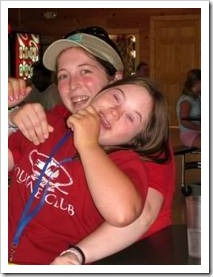
Down Syndrome can be detected during pregnancy by checking the amniotic fluid (Amniocentesis) or after birth by a quick physical test. In 1866, a British physician named John Langdon Down described the condition. Almost 100 years later, Jerome Lejeune discovered it was caused by an extra copy (whole or part) of the 21st chromosome. The chance of having a baby with Down Syndrome is 1 in 733, but it becomes more common with the age of the parents.
Apart from very distinctive facial features, the average IQ of kids with Down Syndrome is 50, as opposed to the general IQ average of 100. Their health is very poor and their life expectancy is very low, and even though their life expectancy is increasing, the intellectual and physical disabilities remain part of their life and the life of their parents.
The announcement of the condition came to the couple as a shock, but surprisingly, their family and friends took it even harder. While Naomi talked to people on the phone, she found herself comforting them, rather than them comforting her. Some people even said silly things, not because they were mean, but because they had never experienced the grief of losing a baby. It reminded me of the things people said to me after losing my second baby, “Never mind, you will have another one”. As a grieving mother, I was not in the right state of mind and that sounded to me as if I were a machine on an assembly line, going for make the next product.
It was amazing to hear how people reacted. The first reaction was, of course, “Is it definitive?”, “Can you have another test to make sure?” and “Is there anything they can do to reverse this?” Unfortunately, the Amniocentesis merely confirmed the earlier Alpha feto-protein test result that clearly showed a problem. The doctor showed her 5 different tests indicating an extra 21st chromosome.

I remember the ethical debate we had during my special education studies. We talked about “innocent lives”, “rights” and “choice”, but how on Earth can you use “right” and “choose” in the same sentence? It is an oxymoron!
I always thought that when talking ethics, we are only debating whose definition is more important? Who is more important, the Down Syndrome baby’s life or the lives of about 50 people around them (parents, siblings, grandparents, uncles, aunties, cousins and friends) whose lives will change significantly? What about the education and health systems that need to support them for the rest of their life?
Throughout the discussion, I was surprised by parents of kids with Down Syndrome who justified their own condition. I am not talking about those who discovered the condition at birth and had not known their baby might have Down Syndrome. Those people should be admired for doing the best to make the most of this condition and find the “gifts” in a bad situation. We can learn from them how to make the most out of life and how to deal with the condition, but cannot take their recommendations to abort or not to abort the pregnancy.
I have heard some people talking about the baby’s right to live and that the parents have no right to kill a baby just because it is “damaged”. I do not know about you, but I find it more problematic when parents cause damage to their babies by smoking, using drugs and abusing their body during pregnancy, but I do not hear the same noise being made about these things.
It is amazing that the discussion starts when the test shows a bad result and not when the mother decides to have the test. Why would anyone do a test, especially a risky test like Amniocentesis, if they plan to ignore the results?

Personally, I do not believe I could tell someone else what the “right” thing to do is, because I believe that in this case, “right” is something that no one else has the “right” to choose for you. People who do not have to deal with the consequences of their judgments lose all their “rights” to the decision.
Therefore, the poll is not about whether someone having to make that decision is right or wrong but what would you do if you had to make that choice.
If you found in the 19th week of your pregnancy that you had a baby with Down Syndrome, what would you do?
May you never have to face this choice!
Ronit











